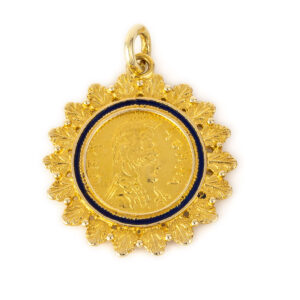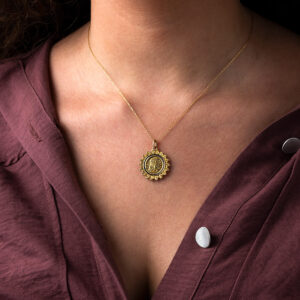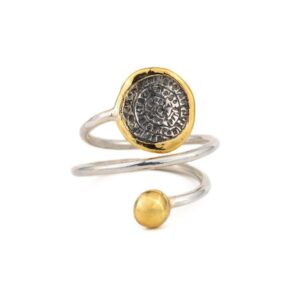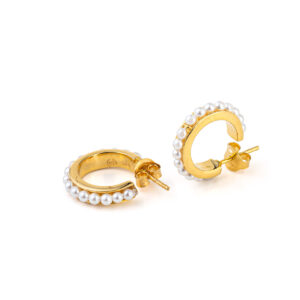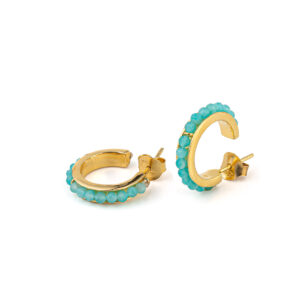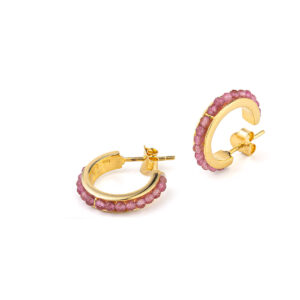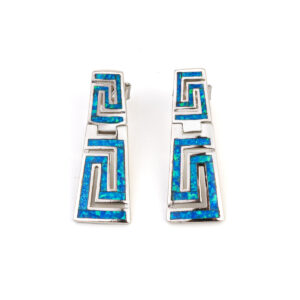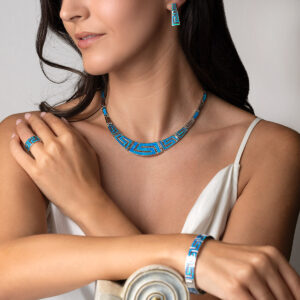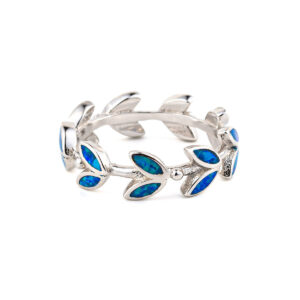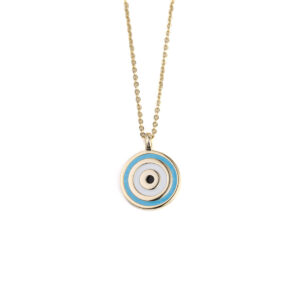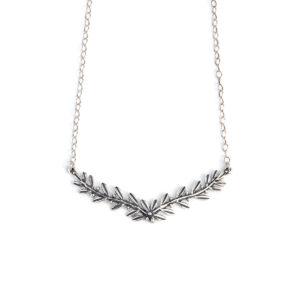14K Gold Goddess Athena Coin Pendant
898,00€The front side of this pendant is decorated with Goddess Athena and the back side is decorated with the wisdom owl
Made in 14k gold and blue enamel.
The chain shown is our Cable Chain in 14K Gold (not included).
Goddess Athena and Owl – Athenian silver tetradrachm
Dracma was the currency used in Greece during several periods in its history.
The tetradrachm was an Ancient Greek silver coin equivalent to fourdrachmae in Athens it replaced the earlier “heraldic” type of didrachms and it was in wide circulation from ca. 510 to ca. 38 BC.
This coin belongs to the so-called “new style Athenian coins” minted between 166 and 64 B.C. and is considered one of the most popular ancient Greek coins which illustrate the portrait of Goddess Athena on the one side and the wisdom owl on the other. Athena is an ancient Greek goddess associated with wisdom, handicraft, and warfare.
Athena was regarded as the patron and protectress of various cities across Greece, particularly the city of Athens, from which she most likely received her name. She’s usually shown in art wearing a helmet and holding a spear. Her major symbols include owls, olive trees, and snakes. Her temples were located atop the fortified Acropolis in the central part of the city. The Parthenon on the Athenian Acropolis is dedicated to her, along with numerous other temples and monuments. Her main festival in Athens was the Panathenaia, which was celebrated in midsummer and was the most important festival on the Athenian calendar.
In the classical Olympian pantheon, Athena was regarded as the favorite daughter of Zeus. The owl traditionally accompanies Athena. Because of such association, the owl has been used as a symbol of knowledge and wisdom. The inscriptions contain the city’s “national” appellation (“ΑΘΕ», i.e. “of the Athenians”). As in all handmade items there may be small differences in weight and dimensions and this is what makes them unique and precious.
Phaistos Disc Ring – 14k Gold and Sterling Silver
This beautiful gold ring represents the disc of Phaistos.
Made of 14K Gold and 925⁰ sterling silver.
The Phaistos Disc is a disk of fired clay from the Minoan palace of Phaistos on the island of Crete. Now, the island of Crete is part of modern Greece. The disc was discovered in 1908 by the Italian archaeologist Luigi Pernier in the Minoan palace-site of Phaistos. While it is not clear that it is a script, most attempted decipherments assume that it is; most additionally assume a syllabary, others an alphabet or logography or a calendar.
Handmade item.
Pearl Stud Earrings – 925 Sterling Silver and Gold Plated
Made of 925⁰ sterling silver and gold plated.
Handmade in Greece
As in all handmade items there may be small differences in weight and dimensions and this is what makes them unique and precious.
The collection contains jewelry with unique semi precious stones in beautiful colors.
Amazonite Stud Earrings – 925 Sterling Silver and Gold Plated
Made of 925⁰ sterling silver and gold plated.
Handmade in Greece
As in all handmade items there may be small differences in weight and dimensions and this is what makes them unique and precious.
The collection contains jewelry with unique semi precious stones in beautiful colors.
Rose Tourmalines Earrings – 925 Sterling Silver and Gold Plated
Made of 925⁰ sterling silver and gold plated.
Handmade in Greece
As in all handmade items there may be small differences in weight and dimensions and this is what makes them unique and precious.
The collection contains jewelry with unique semi precious stones in beautiful colors.
Blue Opal Meander Earrings – 925 Sterling Silver
A pair of earrings with Greek Key – Meander design.
Made in 925⁰ sterling silver with blue opal.
Handmade in Greece
Explore Meandros Collection
Meandros design is a decorative border constructed from a continuous line, shaped into a repeated motif. Such a design is also called the Greek fret or Greek key design, although these are modern designations. On the one hand, the name “meander” recalls the twisting and turning path of the Meander River in Asia Minor, and on the other hand, as Karl Kerenyi pointed out, “the meander is the figure of a labyrinth in linear form” the meaning is that there is no beginning and no end in some cases so it becomes the symbol of long life and eternity.
Opal Wreath Leaf Ring- 925 Sterling Silver
Ring inspired by the olive leaf symbol. The olive tree in Ancient Greece was a symbol of the Olympic ideal, since an olive branch was the only prize for the Olympic champions. Τhe olive tree symbolizes peace, victory, honor and prosperity.
Made of 925⁰ sterling silver with blue opal stone.
Handmade item.
Enamel Eye Necklace – 925 Sterling Silver and Gold Plated
A beautiful necklace representing the evil eye protection symbol.
Made of 925⁰ sterling silver and gold plated.
Handmade in Greece.
Explore Mati Collection
Evil Eye
The symbol and superstition of the evil eye is one of the strongest symbolic images in the world. The earliest known evidence for belief in the evil eye goes back to ancient Greece and Rome. It is supposed to wear off evil to anyone who wears it and various cultures believe in that, however in Greece it’s blue because at that time blue eyes were not so common and were thought to give the evil eye, so the blue is like a mirror to them. Nowadays it’s widely known and has become a trend.
Olive Leaf Necklace – 925 Sterling Silver
A necklace inspired by the olive branch, a symbol of peace, abundance and achievement.
Design inspired by Ancient Greece.
Made of 925⁰ sterling silver.
Handmade in Greece.
Explore Olive Collection
The olive wreath also known as kotinos was the prize for the winner at the ancient Olympic Games. It was an olive branch, of the wild- olive tree that grew at Olympia, intertwined to form a circle or a horse-shoe. According to Pausanias it was introduced by Heracles as a prize for the running race winner to honor his father Zeus. In the ancient Olympic Games there were no gold, silver, or bronze medals. There was only one winner per event, crowned with an olive wreath made of wild-olive leaves from a sacred tree near the temple of Zeus at Olympia. Olive wreaths were given out during the 2004 Summer Olympics in Athens in honor of the ancient tradition because the games were being held in Greece.
